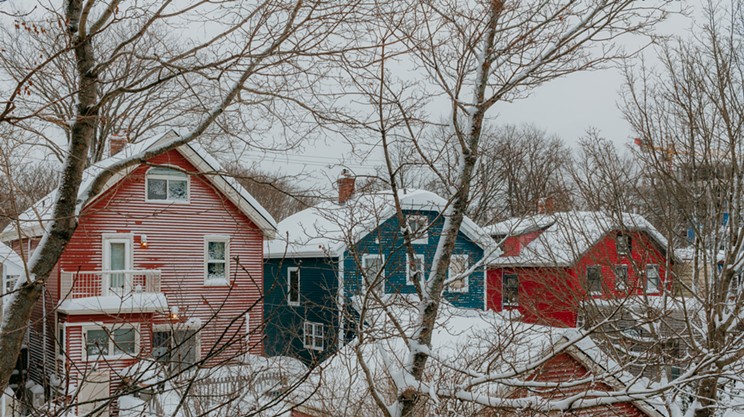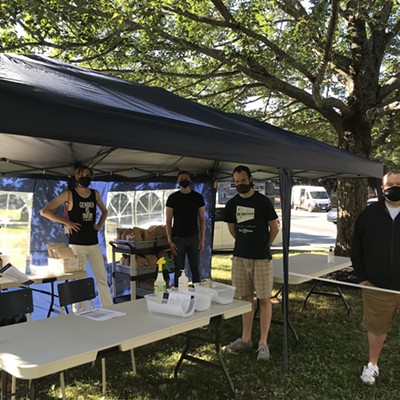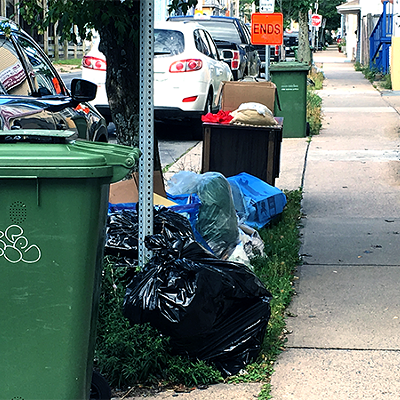The big story through the late part of this year, as colder weather replaces our mild lingering summer days, will be the high cost of heating. In August 2007, the price of oil was just under 60 cents a litre, and today it's approximately twice that, with prices likely to rise as demand increases with the onset of winter. To compound matters, Nova Scotia Power has applied for a rate hike which, if approved by the Nova Scotia Utility and Review Board, will increase residential electricity bills by around 12 percent as of January 1, 2009.
With information like this in hand, if you're a student on the hunt for off-campus housing, an apartment that includes utilities in the overall rent is probably on your radar. Finding such a beast may not be easy.
"This is anecdotal our sense of it is that there are fewer places where heat is included, most especially in Halifax compared with cities in other provinces," says Megan Leslie, a community legal worker at Dalhousie Legal Aid, who works with the Affordable Energy Coalition, a community anti-poverty and environmental group that advocates universal access to affordable energy reserves. "We will tell people, to help them budget. Rent is $500, but you need to know what the heating costs are. You can guarantee you're going to have to pay it."
Leslie's advice is to consider the Heating Assistance Rebate Program offered by the province for low-income households, which can amount to $200 back on the cost of heating energy. "If you're low-income, you can get some money back," she says. "If you're a student you should qualify."
"If the is providing heat and they say, 'We can't afford this anymore, you're going to have to pay it for the rest of the winter,' that's illegal."
And even if you find a place where the utilities are included, the likelihood of a power rate increase in January means that landlords are liable to set the rent substantially higher than it would be where utilities aren't part of the deal. Leslie suggests tenants should spend a little time becoming familiar with the Residential Tenancy Act, so that they know their rights around the subject of utilities, especially Section Nine that lists the statutory conditions. "It does say if a service is provided by a landlord and that landlord discontinues the service, it's tantamount to a rental increase. So, if they're providing heat and they say, 'We can't afford this anymore, you're going to have to pay it for the rest of the winter,' that's illegal."
Maybe with all the headaches around paying for utilities, staying in residence is the safer and warmer option. As the Nova Scotia representative of the Canadian Federation of Students, Kaley Kennedy has been involved in campaigns for rent control and to ensure that students are getting fair treatment from the Residential Tenancy Board. The ironic fact is that students actually have more rights in a tenant agreement with a landlord than in a school dorm, says Kennedy. "If a student is living in residence and they have a problem with their heating, there's nothing that student can do to force the school to make repairs. And, since students pay their residence fees in term chunks, if they want to move out for whatever reason, they have no real way to get any amount of money back."
Kennedy suggests that one of the things a student should be doing when considering off-campus housing is asking the previous tenant what they paid in utilities. "Make sure their landlord is willing to put forth repairs to make sure the house is well-insulated," she says. "Get the landlord to pay for things like plastic for the windows and making sure there's no drafts coming in." Members of her organization have seen difficult times as a result of the absence of rent control, and it's resulting in students moving into substandard housing. "The rate hike is going to hit students really hard," she says. "We know students are waiting until January to put on the heat, and accessing more emergency bursary and loan funds through the universities to be able to deal with these costs."
At one time, Service Nova Scotia offered free energy efficiency kits full of supplies for renters or homeowners, to help seal drafty old windows and the like. Tracking down what happened to these kits, which are no longer available, led this reporter to Conserve Nova Scotia, the provincial energy conservation and environmental agency. It has a number of programs in place (including Energuide for Houses) that financially benefit the homeowner who wants to make his or her house more energy efficient.
"It's our job to work with the landlord, but we can offer advice ," says Donald Dodge, the Conserve NS program administration officer. "The least expensive changes to make to a home or apartment are in areas that deal with air leakage, especially in Halifax where we have a lot of old houses turned into flats. Concentrate on the obvious areas, the windows and doors. Or, if you have cold floors, area rugs are great. Make sure you don't have any furniture blocking baseboard heaters." He also points out, "You don't want to make any changes in the home without the landlord's permission."
A trip to your local Canadian Tire will provide a few of the tools you need to fix the problems on Dodge's hitlist: Plastic for the windows (tape and a hair-drier may be required for sealing), weatherstripping and caulking up the gaps are all good ideas, as is keeping your thermostat low when you go out. It might be a good idea to stock up on sweaters and blankets.
"I used to sell oil for Esso," says Dodge. "In south end Halifax I had lots of students for customers. I was always amazed to go into their places and find them in shorts and t-shirts. Maybe that's because they lived with their parents and it's their first time away from home. It's a hard lesson to learn. If you're paying your oil bill you'd better keep your sweater on and get some slippers."
There is the idea that it may be a more environmentally sound practice if all utilities were included in rental properties by law. That would force the landlords to be responsible for their own buildings' heat and energy waste, encouraging homeowners to install those energy efficient upgrades before they decide to use the property as income and rent it out. Donald Dodge sees the potential renters' abuse of such an equation. "At least a portion of your energy bill is tenant behaviour. You put the onus on the landlord, if feels warm they can open a window."
Energy efficient practices are a concern for Megan Leslie, but she sees the powerlessness of the renter in this scenario. "If the tenants are paying for their own heat---which they are here, which is what we see---they don't have the money to make the upgrades. We have some of the oldest housing stock in Canada. It's like living in a tent---the heat is just escaping---and why would a landlord bother fixing it up?"
Approximately 60 percent of homes in Nova Scotia are heated by oil, 30 percent by electricity and 10 by other means, such as wood. The advantage of finding a place heated by electricity isn't in the savings, necessarily, but in the fact that Nova Scotia Power offers a payment plan for electric heat.
"Budget billing: They look at what the usage was in the unit the year before and they average it out," says Leslie. "So at least you're not paying $400 heating bills in the winter and $20 light bills in the summer, you're paying it over the entire year." Some oil companies will offer a similar fixed-price payment, or a budget payment option where you pay an average price over the course of 10 months unaffected by the market cost of fuel, provided your credit is good and you sign up for regular delivery.
Another option, if your place is heated by oil, is to just have it delivered periodically when absolutely necessary---when the tank is almost bone-dry. You may wind up saving money, but the peace of mind of having a regular delivery schedule probably outweighs the potential savings. It's no fun having your pipes freeze in February because the oil tank is empty---the result of you being holed up at the school library, too busy with essays and projects to keep checking on it.
Dalhousie Off-Campus Housing has a lot of good contacts and advice when looking for an apartment. See housing.dal.ca, or try Saint Mary's site, smu.ca/och.
Warming up
1. Bundle the hell up: Mittens and scarves for inside living, get used to it.
2. Find somewhere with a working fireplace or wood stove.
3. As a last resort, take your grandfather’s advice: Know the liquor store hours and stock up on antifreeze---the kind he endorses.




















